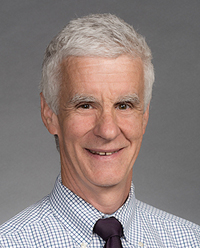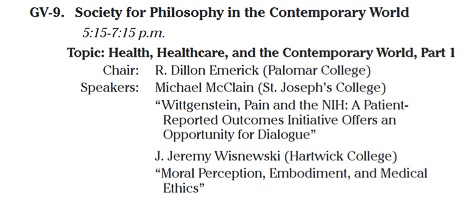| E-mail me at mcclainm@optonline.net | Visit my Facebook page | View my LinkedIn profile |

 |
| Waiting for Guffman |
My experience as a presenter at last week's meeting of the American Philosophical Association in Washington D.C. was much the same as theirs.
Last spring Wendy sent me a notice that the Society for Philosophy in the Contemporary World was soliciting papers on the topic of Health, Healthcare, and the Contemporary World for the APA's Eastern Division meeting in December. My recent success presenting a paper on Kant at the Long Island Philosophical Society led me to think I could succeed on a larger stage. My topic was Ludwig Wittgenstein and the National Institutes of Health on the language of pain—not the most scintillating of topics, but one that had the virtue of referencing philosophy, healthcare and the contemporary world in a single title.
I had heard about an NIH initiative called PROMIS at a departmental Grand Rounds. The idea behind PROMIS is to create standardized instruments to measure pain and other patient-reported outcomes, such as satisfaction or fatigue. This will allow social scientists to compare results across studies and will provide tools for the FDA to evaluate product claims by drug and medical device manufacturers. I was intrigued by the epistemological questions associated with creating scales to measure things which, by definition, cannot be observed directly.
The PROMIS initiative gave me the healthcare and contemporary world bits, but I needed a hook into philosophy. Rummaging through the dustier regions of my mind, I dredged up a tattered memory of Ludwig Wittgenstein's discussion of pain and private language in his Philosophical Investigations. I hadn't read the Investigations since I was a graduate student in the mid-seventies and was unsettled to rediscover how impenetrable it is, but I had the entire summer and autumn to get a grip on it. A lawn chair in the front yard and a stack of secondary sources from the Stony Brook University library helped raise my level of Wittgensteinian competence from nil to passable—so long as I wasn't grilled too closely.
 |
| Dr. Mark Sullivan |
One last doubt clouded my consciousness: did I get the science right? When the paper was in almost final form, I sent it to Doerte Junghaenel, PhD, a behavioral scientist in the Applied Behavioral Medicine Research Institute at Stony Brook. She was familiar with Wittgenstein and graciously agreed to read my paper before I took it to D.C. She gave me a pass on the science, but gently lobbed a couple of insightful critiques at my conclusions, which I quickly reworked, which improved the paper greatly.
 |
The presentation took place in the McKinley Room of the Marriott Wardman Park Hotel at 5:15 p.m. My co-presenter, Jeremy Wisnewski, from Hartwick College in Oneonta, NY, was there, as was David Chan from the University of Wisconsin, who chaired the session. The audience was sparse but attentive. Mary Rorty, who co-edits the APA's Newsletter on Philosophy and Medicine was in attendance and asked if she could publish our papers (Yes!).
My presentation was of about the same caliber as Red, White and Blaine. Wendy said it was good—and she wouldn't say it if she didn't think so. Doerte Junghaenel called it "interesting and thought provoking", though she may have been being polite. I sent the paper to Mark Sullivan a week or so before the presentation. When I got back to the hotel room after the session, I received a complimentary e-mail from him in which he expressed agreement with my principal conclusions.
But I am under no illusions. After attending real sessions in which real experts made real presentations, I came to see that my presentation is roughly equivalent to an amateur theater production in Blaine. But like the characters in Waiting for Guffman, I've caught the bug and have started working up a few ideas for the next conference.
Ever heard of anagnorisis?